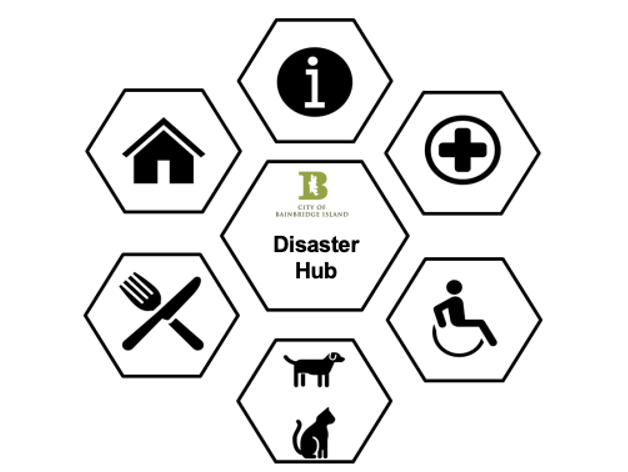
40 people support this project!
Taking care of ourselves and our neighbors during a disaster…
Following a massive earthquake in the region, it is very likely that Bainbridge Island will be unable to access the rest of Kitsap County or Seattle via the Agate Bridge or the Washington State Ferry – they may be unusable for days or weeks. With only a handful of professional emergency responders and limited to no communications, where will people go for help?
Ideally, many of those calls for aid will be filled by you and your neighbors, through your individual and neighborhood preparedness efforts (have you done your Map your Neighborhood yet?). But what if the need is for something that you are not yet prepared for; an injury that is bigger than your home first aid kit can handle, or your garage had just buried your emergency food rations. What if, hopefully, you are able and willing to help more? That is where our Disaster Hub system provides help to the community and its visitors.
HUBS ARE OUR COMMUNITY MEETING POINTS
The Hub program is a partnership between the community, Hub location owners, the City of Bainbridge Island, and Bainbridge Prepares. A Hub is a focus/meeting point for a group of neighborhoods to provide “limited, gap-filling emergency services” following a massive disaster. They will be spread across Bainbridge Island so that community members can easily access a Hub by foot. The main priorities at a Hub are medical care and information sharing. They will also provide limited shelter, food and water, and psychological care for those greatly affected by the event, and unable to be cared for by their neighborhood. Hubs will be staffed by volunteers; Bainbridge Island Emergency Medical Responders (BIEMRs) for medical needs, and registered community member volunteers for other needs.
WHY WE NEED VOLUNTEERS
For these locations to function effectively we rely on our community: 1. Are you prepared? The Hubs rely upon our communities being prepared. If prepared, our volunteers are able to secure their homes and neighborhoods, and respond to ensure that those not so fortunate are taken care of and have a place to receive care . You just need sign up! 2. Hubs will not start operating until those volunteers have taken care of their families and neighborhoods. This could be anywhere from 24 hours to a few days after the disaster. We need a wide variety of volunteers. Please find descriptions for each position in this PDF - https://bainbridgeprepares.org/wp-content/uploads/2021/06/Hubs-Job-Descriptions-v06022021.pdf
WHAT SERVICES DO HUBS PROVIDE?
Medical: BIEMRS, community members with a current Wilderness First Response certification (WFR) will stabilize and treat injuries. For injuries beyond their scope of practice, the patient will be stabilized and transported to a disaster medical clinic or hospital when available.
Information: Liaising with the City of Bainbridge Island’s Emergency Operations Center, the Hub will provide information about the status of the disaster, and information pertaining to it. It is also a central spot where neighborhoods can coordinate and share information to help each other.
Shelter: Hubs provide a temporary secure area for people to seek shelter. More than likely this means a space on the floor. This is intended for those, who through no fault of their own, have nowhere to go (i.e. people visiting or passing through the island, or their house was destroyed and they are waiting for another neighbor to take them in). A Hub is as a place to where people can meet and help each other. It is not a place to rely on to go and have all your post disaster needs met. Hubs will treat and release community members within 24-48 hrs, either transferred to a higher level of medical care, or reabsorbed into their neighborhood. This is about neighbors caring for neighbors.
Your Hub Team Co-Leads are Phil Ferguson and Kathy Hannula-Bral. Please email phil@bainbridgeprepares.org and/or kathy@bainbridgeprepares.org to find out more about the Hubs program or to volunteer.